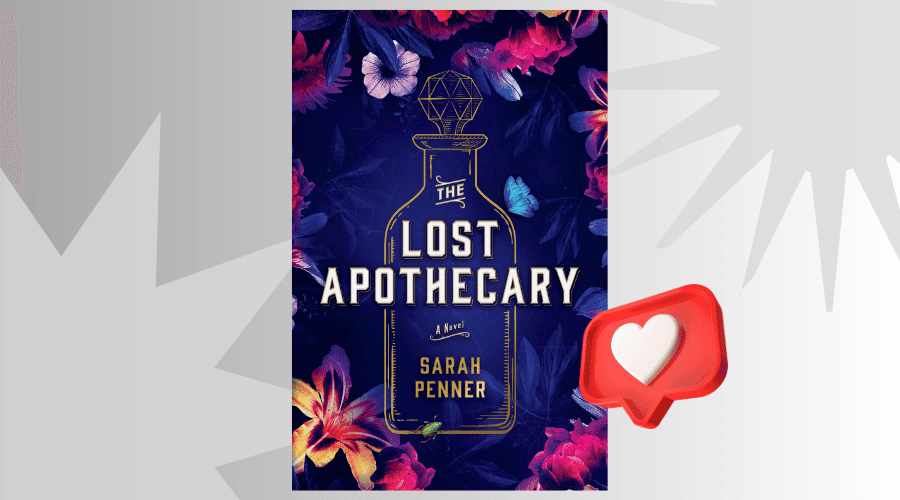The Lost Apothecary by Sarah Penner weaves a spellbinding tale about three women over the centuries. Set in 18th century London, a young apothecary, Nella, provides poisons through which women can defend themselves against oppressive men. An accident involving an innocent young curious girl, Eliza, discloses her secretly-operated apothecary, where dangerous entanglement follows. Now, smarting from a personal betrayal, Caroline discovers an old apothecary vial while exploring London and is pulled into secrets leading her to Nella’s dark legacy. This riveting novel weaves together themes of revenge, survival, and the power of women’s relationships.

| Author | Sarah Penner |
| Publication date | March 2, 2021 |
| Goodreads Rating | 3,75 |
| Page count | 301 pages |
| Genres | Historical Fiction, Fiction, Mystery, Fantasy, Historical, Adult, Contemporary, Thriller, Mystery Thriller |
The Lost Apothecary Summary
In 1791 London, Nella Clavinger has an apothecary hidden behind a false wall and reached only by word of mouth. Instead of the common apothecary services, Nella sells a more sinister service: poisons to women who want to rid themselves of abusive or philandering men. She keeps a logbook of each transaction, a tendency born from her need to memorialize the women she helps. She had begun her work as a form of revenge when her lover, Frederick, betrayed her and made her miscarry their child. However, after all these years handling toxic substances, her health has been affected; she is fragile, physically and emotionally.
Their lives get intertwined with the arrival of 12-year-old Eliza Fanning to Nella’s shop to collect poison for her mistress, Mrs. Amwell. The poison is intended for the abusive Mr. Amwell, who is shown to have predatory intentions on Eliza. Of course, when the poison does eventually kill Mr. Amwell, Eliza returns to Nella’s shop, both mesmerized by her work and seeking refuge from the haunting memories of Mr. Amwell. Eliza, who has just started to menstruate, mistakenly thinks that her bleeding is a sign of Mr. Amwell’s ghost seeking revenge. At an incredibly tender age, she begins working with Nella and soon befriends the elder woman.
A new client, Lady Clarence, comes before the apothecary wanting to poison her husband’s mistress. Nella refuses to carry out the job as she would not commit an act against another woman. Furious at this, the lady threatens to turn Nella’s operation into the authorities. Intimidated by this, Nella agrees begrudgingly and asks Eliza to concoct the poison. As tensions mount, Eliza visits a magic shop where she brews up a tincture meant to reverse bad fortune in hopes it will keep her and Nella safe.
In the present day, Caroline Parcewell, a woman shattered by her husband James’s betrayal, sets off alone on what was supposed to be their anniversary trip to London. On a mudlarking adventure along the Thames, she finds an ancient blue vial engraved with the image of a bear-the symbol of Nella’s apothecary. Curious, Caroline starts tracing the origins of the vial, which ultimately lead her to the history of the apothecary and its connection with a string of unexplained poisonings. Her studies, abetted by Gaynor from the British Museum, lead her to the site of Nella’s old shop. There, she finds remnants of the apothecary and the logbook detailing who Nella’s customers were.
In 1791, everything goes wrong for Lady Clarence, and her husband dies, bringing in the authorities. The constables close in on the apothecary, and Nella and Eliza flee. Nella, weakened from years of handling poisons, struggles to escape. Eliza, in a last-ditch effort to save her friend, drinks her magical tincture and jumps into the freezing Thames, sacrificing herself to throw the authorities off the scent. Miraculously, the tincture protects her from the cold, and she manages to survive. The constabulary believes the apothecary is dead, and Nella and Eliza slip away unnoticed. Nella comes to understand that doling out poisons is not the means to heal her pain, and the two women slip away to rebuild their lives in quiet.
In the present, Caroline confronts her husband when he shows up unexpectedly in London. After a failed attempt to win her back—in which he accidentally drinks eucalyptus oil—Caroline decides to leave her marriage behind and forge her own path. She applies to graduate school at Cambridge, emboldened by her new independence. Yet Caroline, against her scholarly goals, decides to keep the secret of the apothecary alive by hurling the vial into the Thames, saving what really occurred in 1791.
The novel concludes with themes of healing, empowerment, and the enduring strength of women’s solidarity. Nella and Eliza’s story inspires Caroline to reclaim her identity and chart a new course for her life, proving that the past can offer powerful lessons for the present.
The Lost Apothecary Ending Explained [Spoilers]
In the 1791 timeline, Nella and Eliza’s lives are unraveled when Lady Clarence’s poison plot backfires, leading the authorities to hunt for the apothecary. Eliza sacrifices herself by jumping into the Thames after drinking her magical tincture, convincing the authorities the apothecary is dead. Miraculously, the tincture saves her, and she survives to lead a quiet, happy life with Nella as her friend. Nella realizes that doling out poisons is not the way to heal her pain and abandons her apothecary work.
In the present, Caroline finds out about the apothecary and resolves to leave her philandering husband for grad school to regain her lost dreams. She finally drops the vial into the Thames with which she had entered the story, as a form of respect to the memories of Nella and Eliza and a resolution to shed her past for a living future.
The ending brings together the themes of redemption, empowerment, and connectedness between women throughout time. It is a hopeful ending that speaks to healing and reclaiming agency.
The Lost Apothecary Characters
1791 Timeline:
- Nella Clavinger: An unassuming apothecary selling poisons to women seeking justice against men. She was betrayed by a lover and feels guilty and torn apart by her work.
- Eliza Fanning: A very brave 12-year-old servant who became Nella’s unlikely apprentice. Her belief in magic and bravery proved to be crucial for their survival.
- Lady Clarence: A client whose vengeful wishes put the authorities after Nella’s shop, thus putting both Nella and Eliza in danger.
Present Day Timeline:
- Caroline Parcewell: A woman who finds her husband having an affair and then discovers a vial that connects her to Nella’s apothecary. Her story is one of self-discovery and independence.
- James Parcewell: Caroline’s cheating husband, who becomes a catalyst in changing her.
- Gaynor: A British Museum employee who helps Caroline research the history behind the apothecary.
The characters interweave a tale of betrayal, resilience, and women’s empowerment throughout time.
The Lost Apothecary Review
Having finished The Lost Apothecary, I can confidently say it’s a charming story that hooks you right from the beginning. It’s an interesting blend of historical fiction and modern-day self-discovery, sprinkled with feminist rebellion in a way that just makes it feel so empowering. While I really enjoyed it, there were definitely some things that could have been done better. Let me break it down.
What I Loved
- The Premise Is So Unique: So, 18th-century London, and a secret apothecary that exists only to sell women poisons so they can be free from their awful husbands? Brilliant. It’s so darkly intelligent, so very different. You gotta love the moral gray that Nella does even though, or because, it makes you automatically a member of her fan club.
- Dual Timelines That Work: I loved how the book deals with the past and present together between Nella and Eliza and Caroline. That’s such a cool way to unravel the mystery of the apothecary while watching Caroline rediscover herself. Both timelines felt really connected, and I was always excited to see how they’d link up.
- Strong Feminist Themes: It’s all about girls taking back power in a world that tries to cage them. Be it Nella finding purpose after heartbreak, Eliza standing up for herself, or Caroline deciding she was worth so much more, it is incredibly inspiring.
- Atmospheric Vibes: The descriptions of 18th-century London are fantastic-dark alleys, secret shops, the grimy Thames-it feels like you are actually there. The apothecary feels almost alive, full of secrets and danger.
- Quick and Addictive Read: Short chapters, lots of suspense-that’s how I seemed to have flipped the pages without stopping. It is one of those books that you can easily binge on over a weekend without feeling weighed down by the historical aspect.
What Didn’t Work for Me
- Some Characters Felt a Bit Flat: While I liked Nella and Eliza, I wanted more depth from them. Nella’s inner struggle is hinted at, but it never felt fully explored. And Eliza’s curiosity and bravery are great, but she didn’t feel like a 12-year-old-she was way too mature for her age.
- Caroline’s Storyline Was Predictable: I get that Caroline’s journey is supposed to parallel Nella’s, but it felt a little too on-the-nose. The whole “cheating husband” storyline was cliché, and her self-discovery lacked the drama and stakes of the historical timeline.
- The Magic Element Felt Random: There’s a smidge of magical realism with Eliza’s tincture, which is supposed to protect her against bad fortune, but it’s really not explained all that well. It felt thrown in to solve a plot problem, which was a bit of a disappointment.
- The Ending Felt Rushed: I loved the idea of Caroline throwing the vial back into the Thames to protect Nella and Eliza’s secret, but it felt so rushed. I wanted more reflection, more emotion. It was like the story just. stopped.
- The Writing Was Good, Not Great: It’s super readable, but I really wished the prose was deeper. The story and characters were worth more elegant, vivid writing to really bring everything to life.
Final Thoughts
I really enjoyed The Lost Apothecary! What a unique concept, full of twists and dark secrets intertwined with truly empowering moments. It’s not perfect-some parts could have been deeper or more polished-but it is a fun, thought-provoking read, and I really would recommend it.
Would I Recommend It?
Yes! Especially if you enjoy historical fiction, feminist themes, or dual-timeline novels. But honestly, it is a very great book club pick because there’s so much to discuss: the revenge, empowerment, moral dilemmas, and whether or not you’d want to buy poison from Nella. No judgment.
Who Might Not Love It?
If you’re looking for complex characters or something super literary, it might not hit the mark. But if you’re in the mood for something intriguing, atmospheric, and a little rebellious, it’s a total win.

